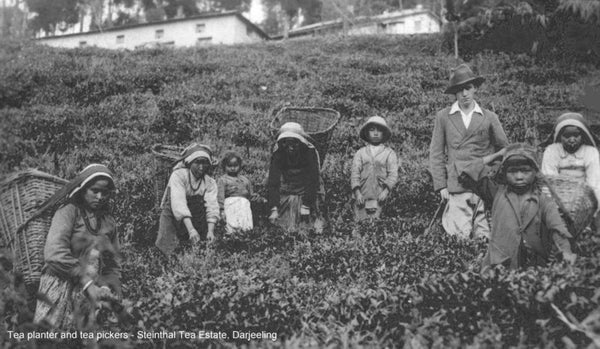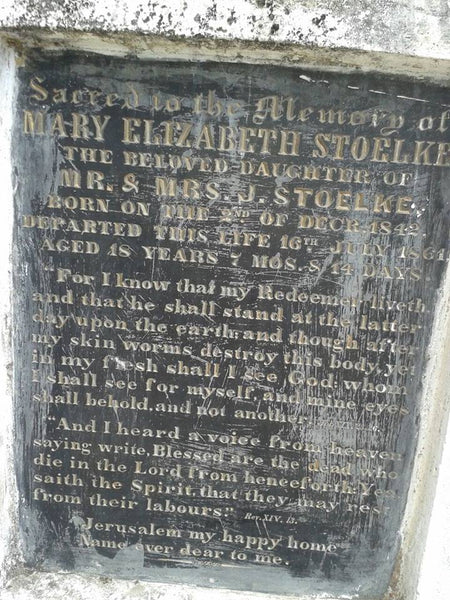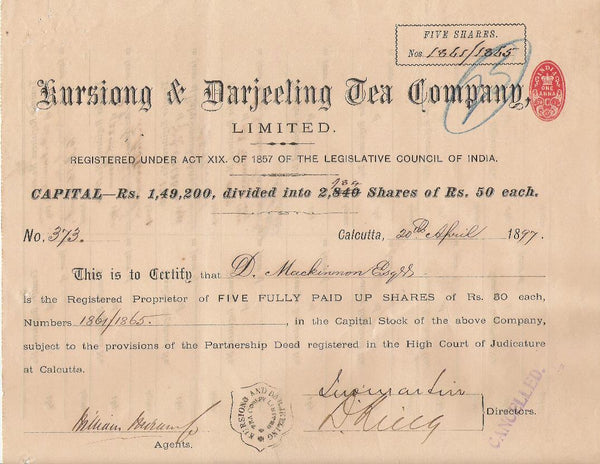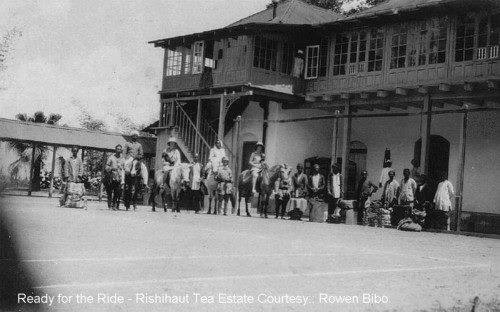
History of Darjeeling Tea ~ German Connection Part 4
In this final part we look at the scant but important history of the Stoelke family in the Darjeeling tea industry. We thank you for taking the time to read and comment on the previous parts. We are indebted to late Fred Pinn, who even though untrained, undertook the thankless and painstaking task of collecting documents and chronicling the history of Darjeeling, a place and a product very dear to many of us.
The Stoelkes
The families of Wernickes and Stoelkes that arrived in Darjeeling in 1842 were essentially one large family. Before departing Germany the men, Joachim Stoelke and Johann Wernicke, had married each other’s sister, Sophie Stoelke and Dorothea Wernicke.
While the Wernickes ran a much larger tea enterprise, it was the Stoelkes who were the first to venture into the fledgling industry. Joachim Stoelke, a first generation settler, set up Steinthal Tea Estate in his homestead of 45 acres, located just below Darjeeling town in the early 1850s. It was one of the first tea estates to be set up in the hills.
Joachim Stoelke was around 41 when he started Steinthal, and although had fallen out of the Baptist mission that originally brought them to the place he must have continued to preach independently. The tea estate even today is often called "Padri Kaman", or the priest's tea garden, by the locals.
According to local historian late Fred Pinn, Joachim might have had to give up some land at Steinthal later for the construction of the town jail. As a compensation the government gave him with a tract of land on the opposite slope where he went on to establish another 160 acre tea estate of Risheehat - a popular garden today with many Darjeeling tea fans. Unfortunately, the lives of Stoelkes are not as well documented as the Wernickes’.

Joachim must have been a strong man mentally and physically to take on the challenge of setting up and running multiple gardens. Not only very little was known about tea cultivation at the time but living conditions were still pretty rugged. His brother-in-law and compatriot Johann Wernicke had already succumbed to sickness in 1861, aged 46.
Joachim established Risheehat around at the time when his nephews Andrew and Fred Wernicke started working in the tea gardens as assistant managers. The Wernicke brothers started working early partly because of their father’s untimely death and the need to provide for the family. Interestingly, the Wernicke brothers did not appear to have been involved with the tea gardens of their uncle Joachim. A distance had developed between these two families, which Pinn notes in his chronicle.
Joachim died in 1876 aged 67, and his wife died three years later. After his death Joachim’s two sons John and William took over the gardens. Eventually the sons concentrated on the larger Risheehat tea estate, leaving Stienthal to the care of their sister and brother-in-law, Dorothea Stoelke and William Sinclair.

While John Stoelke died a bachelor in Risheehat in 1911, his younger brother known more popularly as "Willie" had taken a Lepcha woman “Akhi” as a "common-law wife," with whom he had at least 11 children. This was not a very common occurrence and it could have been one of the reasons for the rift between the two German families.
Interestingly, by the second generation both the Stoelkes and the Wernickes had begun to adopt “Anglicized” identities. They started to send their children to boarding schools in England and take on not just English names, but also as in Wernickes’ case, the last name. The latter eventually took forms such as Wrenick, Wren, Warwick and Verniquet for “patriotic” reasons, as Pinn notes, and as also pointed out in a comment by one of the Wernicke's descendants.

Pinn is right. Also being a German in English territory also could be a liability during the World Wars as an incident that took place later in Darjeeling showed. According to the diaries of a Darjeeling resident who lived at the time, around "six German residents including a priest in white robe" were arrested and taken down to Fort William in Calcutta in September 1939 as war broke out in Europe. Surely these Germans were guilty of just being in the wrong place at the wrong time.
Willie died "strangely" two months after his older brother, and Akhi is said to have followed him within matter of months too. She was cremated in Risheehat.

After the death of William and Dorothea their children, Norman, Stanley and Dora ran the two gardens. Norman who looked after Risheehat sold it off in the 1930s and left the country for England with his family. Stanley was left with Stienthal but he fell into hard times financially. The family’s circumstances were impoverished and Stanley died of a heart attack in 1938 and is buried in Singtom Cemetery, according to Pinn. All of Stanley’s children had left India by 1949, bringing with it to an end this improbable story of two German families who came from a small village outside of Berlin and by a twist of fate got sucked into creating one of the best teas known to mankind.
The Wernickes and Stoelkes may not have saved the natives from perdition, as they originally set out to do, but they certainly gave them something to be very proud of. And to the world they gave Darjeeling tea, heaven in a cup.
History of Darjeeling Tea - the German Connection ~ Part 1
History of Darjeeling Tea - the German Connection ~ Part 2
History of Darjeeling Tea - the German Connection ~ Part 3
PS: This series has been almost entirely based on the book "Darjeeling Pioneers, The Wernicke-Stolke Story" by Fred Pinn. You can visit the publishers Pagoda Tree Press for a copy.

